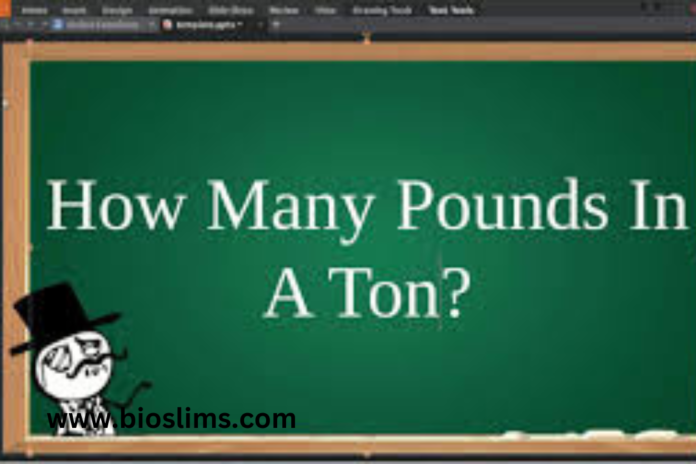If you’ve ever wondered, how many pounds in a ton are in a ton?” you’re not alone. This common question arises in various contexts, from everyday life to industries like construction, transportation, and logistics. Whether you’re dealing with shipping weights, measuring materials, or simply satisfying your curiosity, knowing how to convert tons to pounds is essential.
In this comprehensive guide, we’ll explore the answer to this question, discuss the different types of tons, and highlight how this knowledge can be applied in real-world scenarios. By the end of this article, you’ll have a clear understanding of how many pounds in a ton are in a ton and why the answer may vary depending on the context.

How Many Pounds Are in a Ton?
The number of pounds in a ton depends on the system of measurement being used. There are two primary types of tons: the short ton and the long ton. Additionally, there is the metric ton, which is part of the metric system. Let’s break these down:
- Short Ton (US Ton)
The short ton, commonly used in the United States, is equivalent to:
- 2,000 pounds
- Long Ton (Imperial Ton)
The long ton, also known as the Imperial ton, is used primarily in the United Kingdom and other countries that follow the Imperial system. It is equal to:
- 2,240 pounds
- Metric Ton (Tonne)
The metric ton, commonly referred to as a “tonne” in countries that use the metric system, is slightly different. It is equal to:
- 1,000 kilograms, which converts to approximately 2,204.62 pounds
To summarize:
- 1 short ton = 2,000 pounds
- 1 long ton = 2,240 pounds
- 1 metric ton = 2,204.62 pounds
Knowing which type of ton is being referred to is crucial for accurate conversions and calculations.
Understanding the Differences Between Short, Long, and Metric Tons
To fully grasp why there are different types of tons, let’s dive into their origins and uses.
Short Ton
The short ton, also known as the US ton, is primarily used in the United States for measuring large weights. It’s the standard unit of measurement for industries such as agriculture, mining, and transportation within the country. For example, when you see a truck’s weight limit in the US, it’s usually specified in short tons.
Long Ton
The long ton has its roots in the British Imperial system and is still used in some contexts in the UK. It’s 240 pounds heavier than the short ton, making it slightly larger. The long ton is often used in maritime and shipping industries.
Metric Ton
The metric ton, or tonne, is part of the International System of Units (SI). It’s widely used around the world, particularly in countries that have adopted the metric system. The metric ton is a convenient unit of measurement in industries like science, engineering, and global trade, thanks to its alignment with the decimal-based metric system.
Applications of Ton-to-Pound Conversions
Understanding how many pounds in a ton are in a ton is essential for various practical applications. Here are some real-world scenarios where this knowledge comes into play:
- Shipping and Logistics
In the shipping and freight industries, weight limits are often specified in tons. Knowing how to convert tons to pounds ensures that goods are loaded correctly and within legal weight limits. For example, if a truck has a maximum weight capacity of 10 short tons, you’d know this equals 20,000 pounds.
- Construction and Building Materials
In construction, materials like gravel, sand, or concrete are frequently measured in tons. Understanding the weight in pounds helps contractors and suppliers calculate the exact quantities needed for a project. For instance, if a supplier delivers 5 metric tons of sand, it’s essential to know this is approximately 11,023 pounds.
- Agriculture
Farmers often deal with large quantities of crops, fertilizers, or livestock feed measured in tons. Converting these weights to pounds allows for more precise planning and inventory management. For example, a farmer purchasing 3 long tons of hay knows they’re getting 6,720 pounds.
- Energy and Fuel
Coal, oil, and other energy sources are frequently measured in tons. For instance, the coal industry often uses short tons to report production and consumption statistics in the US, while metric tons are used in global trade.
- Environmental Impact and Recycling
Recycling programs often measure materials like metal, glass, or plastic in tons. Understanding the weight in pounds can help individuals and organizations track their contributions to reducing waste. For example, recycling 2 metric tons of aluminum saves approximately 4,409 pounds of raw material.
How to Convert Tons to Pounds (Step-by-Step Guide)
Converting tons to pounds is straightforward once you know which type of ton you’re dealing with. Here’s a step-by-step guide:
Step 1: Identify the Type of Ton
Determine whether the weight is given in short tons, long tons, or metric tons.
Step 2: Use the Appropriate Conversion Factor
- Short Ton to Pounds: Multiply the number of short tons by 2,000.
- Long Ton to Pounds: Multiply the number of long tons by 2,240.
- Metric Ton to Pounds: Multiply the number of metric tons by 2,204.62.
Step 3: Perform the Calculation
Let’s look at a few examples:
- Convert 3 short tons to pounds:
- 3 × 2,000 = 6,000 pounds
- Convert 2 long tons to pounds:
- 2 × 2,240 = 4,480 pounds
- Convert 5 metric tons to pounds:
- 5 × 2,204.62 = 11,023.1 pounds
Step 4: Double-Check Your Results
It’s always a good idea to double-check your calculations to ensure accuracy, especially in professional settings.
FAQs About Tons and Pounds
- Why Are There Different Types of Tons?
The differences between short, long, and metric tons stem from the historical development of measurement systems in different regions. The short ton is used in the US, the long ton originated in the UK, and the metric ton aligns with the global metric system.
- How Do I Know Which Ton to Use?
The context usually determines which ton is being referred to. For example:
- Use short tons for U.S.-based measurements.
- Use long tons for maritime and UK-specific contexts.
- Use metric tons for international or metric system applications.
- Is a Metric Ton Heavier Than a Short Ton?
Yes, a metric ton (2,204.62 pounds) is heavier than a short ton (2,000 pounds) but lighter than a long ton (2,240 pounds).
- Can I Use Online Tools for Conversion?
Absolutely! Many online calculators and tools can quickly convert tons to pounds. However, understanding the manual process ensures you can double-check results.
Conclusion
So, how many pounds in a tonare in a ton? The answer depends on the type of ton you’re dealing with:
- 2,000 pounds in a short ton
- 2,240 pounds in a long ton
- 2,204.62 pounds in a metric ton
Whether you’re working in shipping, construction, agriculture, or simply curious about weight conversions, knowing these differences is essential. By understanding the distinctions and applications of short, long, and metric tons, you’ll be better equipped to handle conversions accurately and confidently.
Now that you’ve mastered the concept, you can easily tackle any ton-to-pound conversion you encounter. From personal projects to professional industries, this knowledge is invaluable in ensuring precision and clarity in weight measurements.
You may also read: Viren Merchant Net Worth: Unveiling the Wealth of India’s Business Tycoon
